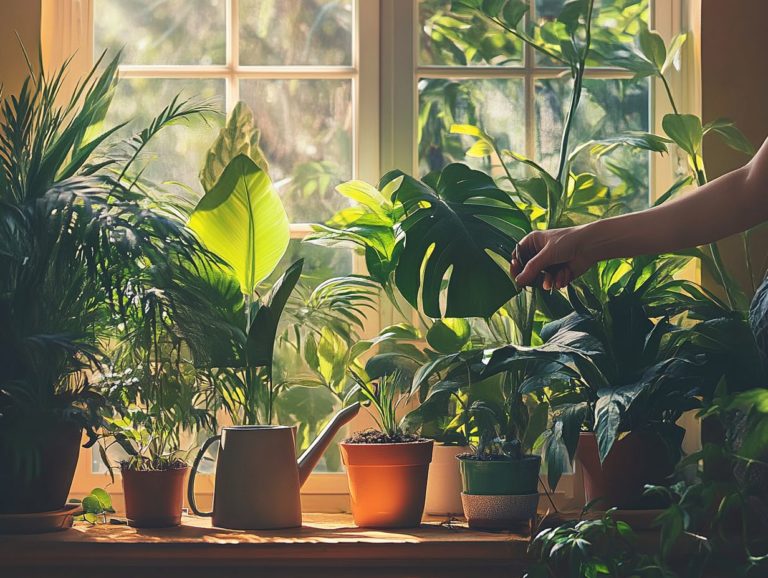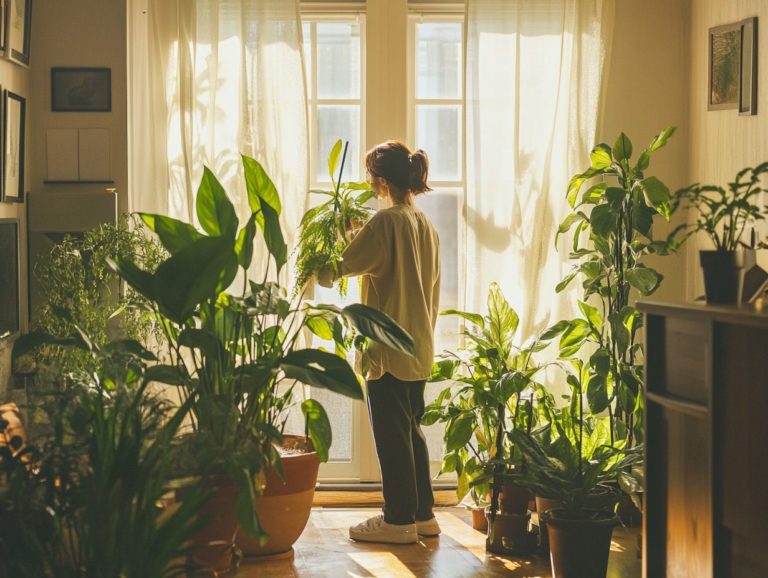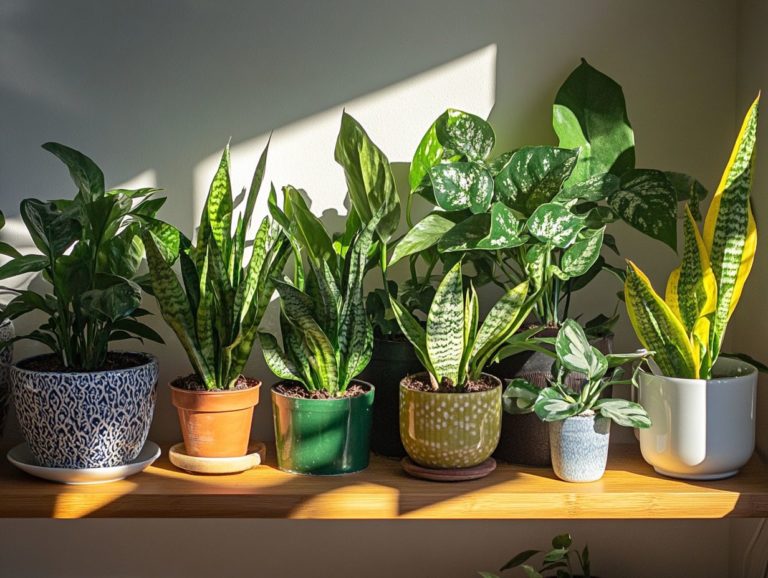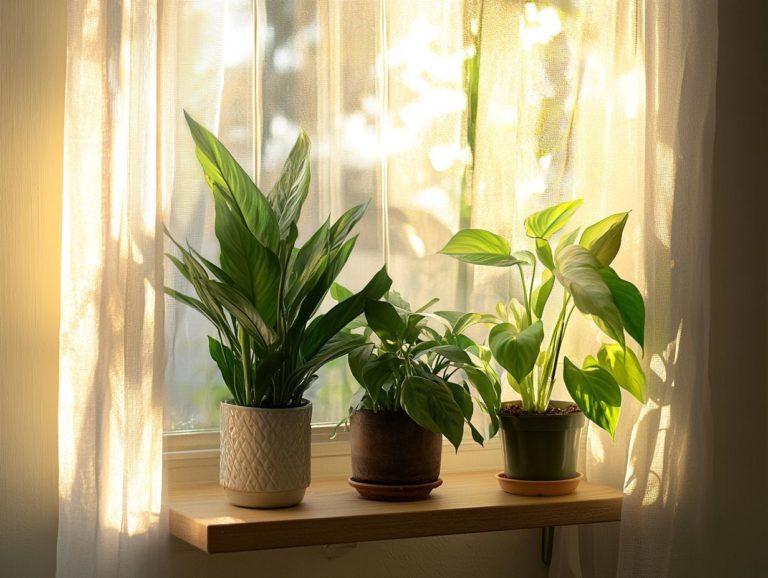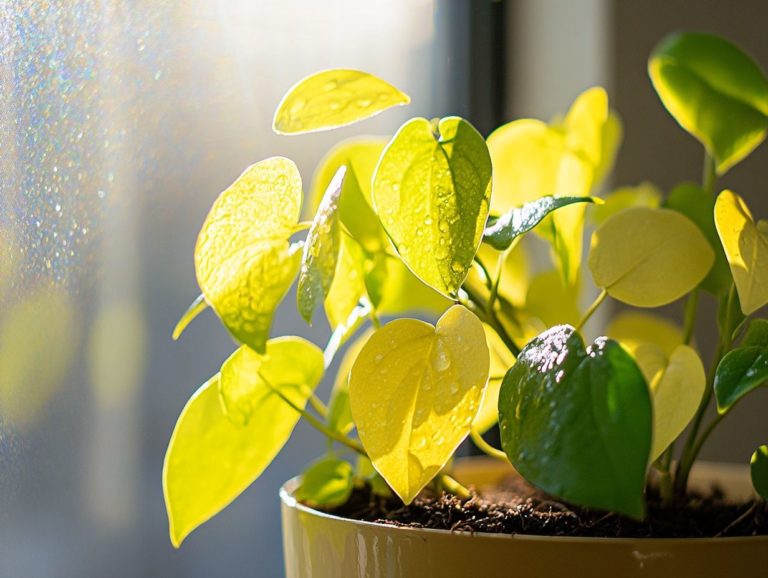How Can Indoor Plants Affect My Mood?
Indoor plants offer more than mere aesthetic appeal; they can profoundly impact your mood and overall well-being, particularly when considering the diverse range of houseplants available.
You ll find that these green companions provide natural stress relief, enhance air quality, and even boost your creativity and productivity, contributing to your overall happiness and life satisfaction.
It s important to note that it s not all sunshine and flowers some indoor plants may provoke allergies or add to your maintenance worries, which could impact your mental health.
That s where guidance comes in. We ll help you choose the right plants that elevate your mood and require minimal care.
Explore how introducing greenery, such as snake plants and pothos, into your space can transform your environment and uplift your spirits, acting as a natural remedy against mental fatigue.
Contents
Key Takeaways:

- Nature’s stress relievers: Indoor plants can provide a sense of calm and relaxation, reducing symptoms of anxiety and stress, especially when engaging in community gardening activities.
- Breath of fresh air: Greenery, particularly popular plants like peace lilies and spider plants, can improve air quality by absorbing toxins and releasing oxygen, boosting overall mood and well-being.
- Boosting creativity and productivity: Plants in the workspace, such as bonsai and philodendron, can enhance focus and creativity, leading to increased productivity and job satisfaction for plant lovers.
What is the Connection Between Plants and Mood?
The connection between plants and your mood is a captivating exploration. Indoor plants, like snake plants and pothos, can profoundly enhance your mental health by effectively reducing stress and anxiety levels, offering numerous health benefits.
Engaging with houseplants, especially varieties like orchids, not only improves the air quality in your living space but also fosters happiness and life satisfaction. This interaction leads to a remarkable boost in productivity and overall mental well-being. Influenced by the idea that humans naturally feel connected to nature, your interactions with these green companions can be remarkably therapeutic, particularly for those experiencing Seasonal Affective Disorder (SAD). Additionally, the influence of indoor plants on mood and decor plays a significant role in enhancing your environment.
They offer a range of health benefits that elevate your mental well-being and help combat mental fatigue, making the practice of gardening all the more rewarding.
Positive Effects of Indoor Plants on Mood
Indoor plants, like peace lilies and spider plants, bring a wealth of benefits to your mood, significantly enhancing your mental health and overall well-being.
Caring for these green companions can reduce stress and anxiety while cultivating a sense of community among fellow plant enthusiasts. This enhances the joy of plant therapy. Research shows that just being around houseplants can yield remarkable health benefits, including a noticeable boost in productivity and a surge in happiness and life satisfaction.
Embracing the art of plant care not only nurtures your green thumb but also enriches your life in countless ways.
Natural Stress Relief
The presence of houseplants, especially indoor varieties like bonsai and orchids, can offer you natural stress relief and promote a feeling of community gardening. This makes them essential for enhancing your mental health and well-being. Interacting with plants has been shown to lower stress hormone levels the hormone linked to stress while promoting a serene atmosphere conducive to relaxation and effectively serving the needs of plant lovers.
Research from the University of Hyogo in Japan has revealed that simply being around greenery can lift your mood and boost overall productivity. Experts recommend weaving plant therapy into your daily routine by starting with low-maintenance options like snake plants or pothos, particularly for those new to gardening. Consider incorporating indoor plants that promote relaxation in decor. These resilient plants thrive on neglect yet still improve air quality.
Creating a green corner in your home office or bedroom with green plants can significantly elevate your emotional state and well-being. Engaging in potting or watering routines can transform what might feel like mundane chores into mindful practices. This allows you to reconnect with your surroundings and cultivate a sense of calm amidst the chaos of daily life, especially in the context of community gardening.
Start today by bringing a plant into your home, and watch your mood bloom!
Improved Air Quality

Indoor plants, like philodendron and peace lilies, are beautiful additions to your space. They also play a vital role in enhancing air quality, significantly improving your mental health and boosting overall productivity. By absorbing toxins and releasing oxygen, these lush greens elevate your environment, creating a healthier living space that supports your well-being.
Research from esteemed institutions, such as Rutgers University and North Carolina State University, reveals that plants can filter out harmful substances like formaldehyde and benzene. This filtration helps reduce the risk of respiratory issues. The American Horticultural Therapy Association, along with professionals like Libby Bolles and Melinda Knuth, strongly advocates for using indoor plants to bolster emotional stability and thinking skills.
To harness the air-purifying benefits of these plants, position them in well-lit areas. Maintain a consistent watering schedule and engage in practices like regular dusting to enhance their health benefits. Regularly dusting their leaves will encourage optimal photosynthesis, cultivating a vibrant indoor ecosystem for you to enjoy.
Enhanced Creativity and Productivity
Integrating houseplants into your work and living spaces can significantly enhance your creativity and productivity. This makes them a beloved choice for plant enthusiasts and professionals, especially those using #PlantTok for inspiration. Research shows that having indoor plants around, including microgreens and desktop-friendly varieties, can improve concentration and motivation.
A study from the University of Exeter found that employees experienced a 15% boost in productivity when surrounded by greenery. This reinforces the mental health benefits of plant therapy. For example, plants like the snake plant not only purify the air but also establish a calming atmosphere, helping to alleviate stress and anxiety. To learn more about the benefits of having indoor plants, consider incorporating more greenery into your space.
To fully enjoy these benefits, consider placing desk-friendly plants like spider plants within arm’s reach or embellishing communal areas with larger foliage such as peace lilies. This thoughtful integration can elevate your mental well-being and foster a more collaborative environment, paving the way for greater innovation and workplace satisfaction.
Negative Effects of Indoor Plants on Mood
Indoor plants bring a wealth of benefits, such as improved air quality, but don’t overlook the fact that they may also have some drawbacks. This is especially true for those with allergies and sensitivities to certain species. For instance, overwatering can create maintenance stress, leading to frustration with plant care.
This added pressure might negatively affect your mood and overall well-being. Remember, even the greenest thumb can encounter challenges in maintaining healthy plants.
Allergies and Sensitivities
Allergies and sensitivities to houseplants can dampen their mood-boosting benefits, leading to discomfort and stress for those affected, especially by plants known for their pollen. Some indoor plants may produce pollen or mold, worsening symptoms and negating the mental health perks of plant therapy.
Take popular plants like English Ivy and certain ferns; they often trigger reactions due to their airborne spores and pollen. To create a more allergy-friendly indoor space, consider alternatives like spider plants or pothos, known for their low allergenic properties, enhancing overall air quality.
Incorporating strategies like regular dusting, using air purifiers, and ensuring proper ventilation can help reduce potential allergens. This fosters a healthier indoor environment. By being thoughtful about your plant choices and care routines, such as establishing a consistent watering schedule, you can cultivate a healthier environment while enjoying the psychological benefits of nurturing greenery in your home.
Overwatering and Maintenance Stress

Overwatering and the pressure of maintaining houseplants can turn the joy of plant ownership into a source of frustration and anxiety. Ultimately, this reduces the mental health benefits and rewards of gardening they re meant to provide.
Proper plant care is essential. If you neglect the needs of your indoor plants, you could end up with unhealthy growth and even more maintenance stress, which can adversely affect your mood and overall mental health.
Common signs of overwatering include yellowing leaves, mold growth, and root rot a condition where roots decay due to excess water. These are red flags that indicate your plant is struggling and may require different care strategies to improve its health benefits.
To effectively manage plant care, it s vital to establish a watering schedule tailored to each plant s specific needs. Consider factors like humidity levels and light exposure to ensure a less stressful gardening experience.
Consider exploring low-maintenance varieties like snake plants and pothos that align with your lifestyle. This can lead to a more enjoyable and stress-free journey with indoor plants.
By being mindful of your watering habits and regularly assessing your plant’s condition, you can build a fulfilling bond with your indoor greenery, ultimately enhancing your mental health and well-being. Incorporating the benefits of using indoor plants in your decor can further elevate your living space.
Choosing the Right Indoor Plants for Mood Enhancement
Selecting the right indoor plants, such as those recommended by experts like Derrick Stowell, can profoundly elevate your mood and overall mental well-being. It s crucial to identify which varieties serve this purpose best.
From the soothing presence of snake plants to the vibrant blooms of orchids, choosing plants that resonate with your personal preferences can significantly enhance their mood-boosting effects, especially with the right plant care.
Types of Plants and Their Benefits
Various types of houseplants, such as microgreens and peace lilies, offer unique benefits that can elevate your mood. Each adds its own aesthetic appeal and health advantages.
Take the snake plant, for example; it not only purifies the air but also demands minimal care. It s a perfect choice for your busy lifestyle while you indulge in a bit of plant therapy that promotes mental health.
Another fabulous option is the peace lily, celebrated for its striking white blooms and remarkable air-purifying qualities. This lovely plant excels at filtering out harmful toxins like formaldehyde and benzene, thriving effortlessly in low-light conditions. It’s ideal for those cozy, dimly lit corners of your home.
Don t miss out on the calming power of lavender to lower your stress levels! Not only does it offer soothing scents, but it s also known to promote relaxation and improve sleep quality.
When selecting houseplants, it s crucial to assess the light and humidity levels in your environment. By doing so, you can ensure that the varieties you choose will flourish, enhancing your surroundings and contributing to a healthier, more vibrant atmosphere.
Considerations for Indoor Plant Care
Effective indoor plant care is essential for maximizing the health benefits that houseplants provide. Neglect can lead to struggling plants and diminish their mood-enhancing effects. Understanding the specific needs of each type of plant, from light and water requirements to soil conditions, is fundamental to successful gardening.
To keep your indoor greenery thriving, establish a consistent watering schedule that aligns with the moisture preferences of your plants. For instance, succulents flourish in drier conditions, while tropical varieties crave more humidity and consistent moisture. Light exposure is equally important; some plants thrive in bright, indirect sunlight, while others struggle in overly bright settings.
Choosing the right soil mix is critical, whether it s standard potting soil for most houseplants or a specialized blend for cacti. Keep an eye out for pests that may target your plants and avoid overwatering, a common pitfall that can lead to root rot. Regularly check for changes in leaf color or texture to identify issues early on, ensuring that both novice and seasoned plant enthusiasts can enjoy a vibrant indoor garden filled with green plants.
Frequently Asked Questions
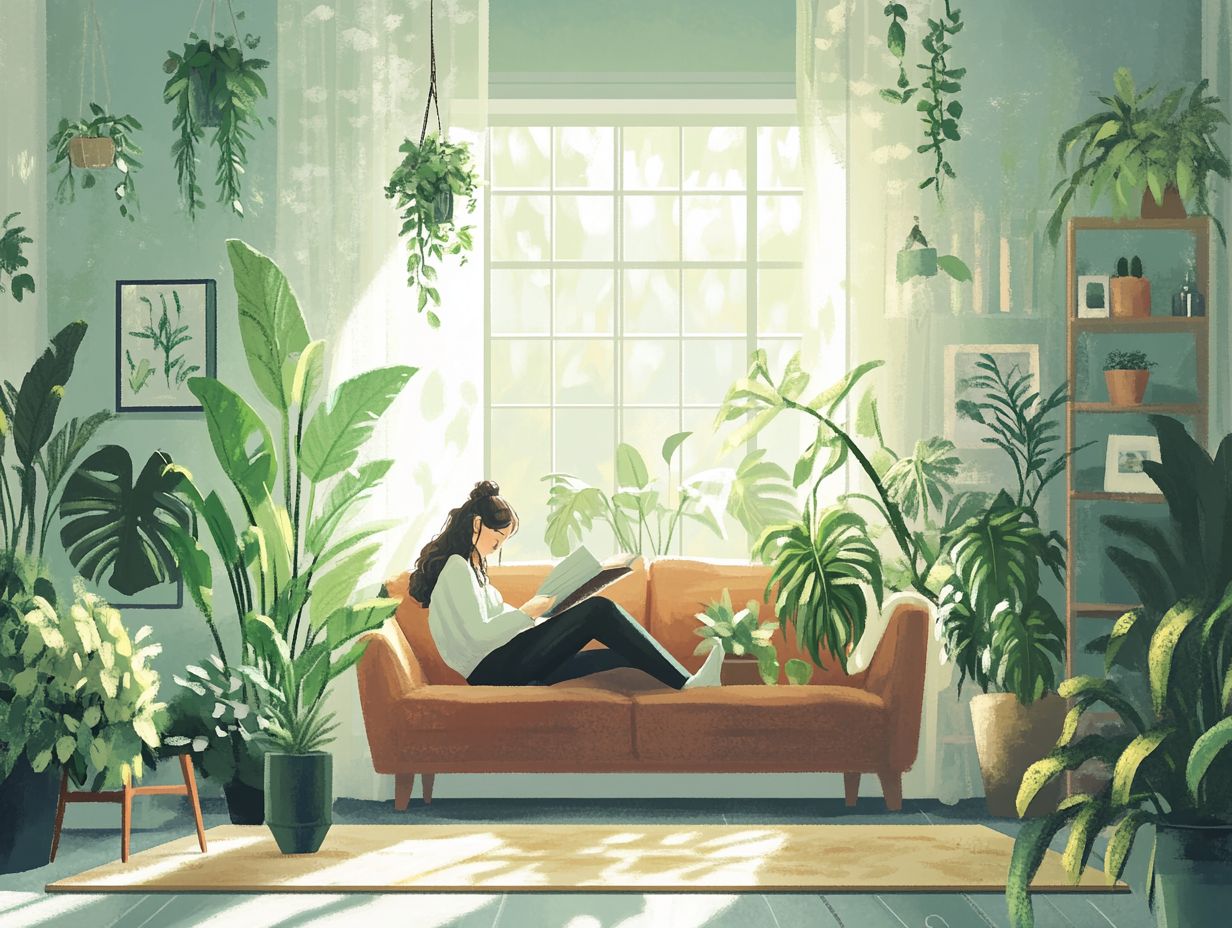
How Can Indoor Plants Affect My Mood?
Indoor plants can brighten your mood! They improve emotional well-being, reduce stress levels, and even boost productivity. This is why plant therapy has gained attention as a method to enhance mental health.
What are the benefits of having indoor plants?
- Purifying the air
- Increasing oxygen levels
- Adding beauty to your space
- Reducing noise levels
- Providing a sense of calmness
Which indoor plants are best for improving mood?
Some of the best indoor plants for improving mood include lavender, snake plant, peace lily, and aloe vera. These plants have calming and purifying properties that positively impact your mood.
Can indoor plants help with anxiety and depression?
Yes, studies have shown that indoor plants can help reduce symptoms of anxiety and depression. The presence of plants creates a calming environment, making it easier to relax, which is beneficial for those struggling with mental health issues.
Do all indoor plants have the same effect on mood?
No, not all indoor plants have the same effect on mood. Some plants, like peppermint and rosemary, can energize, while others, like jasmine and chamomile, can calm. Choosing plants that align with your personal needs and preferences is important.
How many indoor plants do I need to see a change in my mood?
The number of indoor plants needed to see a mood change varies for each individual. However, having just one or two plants in a room can already have a positive impact. It s recommended to have at least one plant per 100 square feet of space for maximum benefits, as this can help lower cortisol levels and enhance overall well-being.
Start your indoor garden today and witness the mood-boosting magic of plants!

